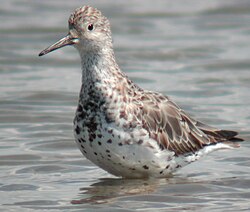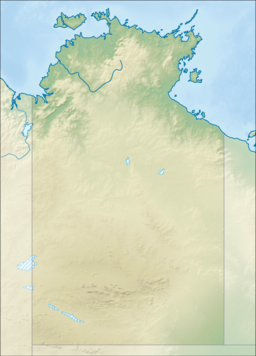Shoal Bay is a shallow bay lying adjacent to, and north of, the city of Darwin in the Northern Territory of Australia. Encompassing Hope Inlet at its eastern end, it is characterised by extensive areas of intertidal mudflats and mangroves and is an important site for waders, or shorebirds. The bay is situated within the Shoal Bay Coastal Reserve, a protected area[4] that was established in 2000.[5]
| Shoal Bay | |
|---|---|
| Location | Beagle Gulf, Northern Territory[1] |
| Coordinates | 12°17′17″S 130°56′28″E / 12.2881°S 130.9411°E[1] |
| Type | Bay |
| Part of | Beagle Gulf |
| Basin countries | Australia |
| Settlements | Gunn Point, Murrumujuk, Shoal Bay, Micket Creek, Buffalo Creek and Lee Point (From east to west)[2][3] |

Shoal Bay is also known for accommodating the Shoal Bay Receiving Station, a signals-intelligence collection facility that contributes to the NSA's global data collection program.[6]
Description
editThe bay comprises the lower reaches of the Howard River and several small tidal creeks that drain into Hope Inlet. Much of the bay is exposed at low tide, with about 100 km2 (39 sq mi) of tidal mud and sand flats. Unlike most other bays in the Northern Territory, it is not associated with large rivers, nor freshwater coastal floodplains. It does include some swamps and remnants of monsoonal vine forest on the margins. Because of its proximity to Darwin it is threatened by urbanisation and land development. It is also affected by invasive species, frequent fires and largely uncontrolled recreational use of the area.[7]
Flora and fauna
editPlants
editSome 61 plant species endemic to the Northern Territory are found around the bay. Of these, three, Cycas armstrongii, Ptychosperma macarthurii and Utricularia dunstaniae, are considered threatened. Two, Utricularia holtzei and Typhonium praetermissum, are only known from the Darwin Coastal bioregion.[7]
Birds
editSome 96 km2 (37 sq mi) of the bay has been identified by BirdLife International as an Important Bird Area (IBA) because it supports, with its low-tide feeding habitat and high-tide roosting sites, over 1% of the world population of great knots.[8] Other birds recorded from the bay in significant numbers include black-tailed godwits, greater sand plovers, Terek sandpipers and beach stone-curlews.[9] Chestnut rails inhabit the mangroves.[7]
Other animals
editApart from birds, threatened animals recorded from the bay and its surrounds include northern quolls, Mertens' water monitors, argus monitors, flatback and olive ridley turtles, dwarf and longcomb sawfish, and Dodd's azure butterflies. Feral pigs and water buffaloes are present. There is an ongoing program to monitor and remove saltwater crocodiles from the bay.[7]
References
edit- ^ a b "Place Names Register Extract - "Shoal Bay"". NT Place Names Register. Northern Territory Government. Retrieved 14 May 2019.
- ^ "Litchfield Municipality Localities" (PDF). Place Names Committee. Northern Territory Government. Retrieved 14 May 2019.
- ^ "Darwin City Council Suburbs" (PDF). Place Names Committee. Northern Territory Government. Retrieved 14 May 2019.
- ^ "Shoal Bay Coastal Reserve". Parks and Wildlife Commission. 2015. Archived from the original on 15 August 2013. Retrieved 29 March 2015.
- ^ "Terrestrial Protected Areas by Reserve Type in the Northern Territory (2012)". Department of Environment. 2012. Retrieved 28 March 2015.
- ^ Philip Dorling (8 July 2013). "Snowden reveals Australia's links to US spy web". The Sydney Morning Herald. Retrieved 30 October 2015.
- ^ a b c d "Shoal Bay" (PDF). Sites of Conservation Significance. Northern Territory Government. Retrieved 7 October 2011.
- ^ "IBA: Shoal Bay (Darwin)". Birdata. Birds Australia. Retrieved 7 October 2011.
- ^ BirdLife International. (2011). Important Bird Areas factsheet: Shoal Bay (Darwin). Downloaded from http://www.birdlife.org on 2011-10-08.
